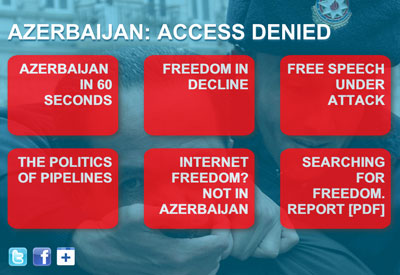18 Jun 2018 | News and features
[vc_row][vc_column][vc_column_text]By Nicole Ntim-Addae and Long Dang. With additional reporting by Shreya Parjan and Sandra Oseifri.[/vc_column_text][vc_single_image image=”100888″ img_size=”full” add_caption=”yes”][vc_column_text]“What do we do next? We are losing our point of reference. The loss of the United States and the United Kingdom as democratic beacons for the rights of journalists and the freedom of information is a bad omen for the rest of the world.”
The question was raised by Javier Garza of Article 19, a British human rights organisation, at the discussion about the growing threats to press freedom in the United States that took place at the Free Word Centre on Thursday 14 June. The panel was held to explore the findings of the unprecedented mission to the USA undertaken by six press freedom groups — Index on Censorship, Article 19, Committee to Protect Journalists, IFEX, International Press Institute, and Reporters Without Borders—in January 2018. Representatives of the groups conducted interviews with journalists in St. Louis, Missouri, Houston, Texas, and Washington DC. Their findings were published in a mission report in May 2018.
Jodie Ginsberg, CEO of Index on Censorship, stated the motivation behind the mission. “It is unusual for press freedom organisations to take a mission to the US”, she said. “According to the findings of the mission, violations of freedom of press and freedom of information may be closer to home.” The mission was carried out in recognition that discussions regarding press freedom are taken for granted in democracies in a way that they are not in authoritarian states.
At the same time, Trump’s hostile rhetoric directed against the US press is problematic for press worldwide. Rebecca Vincent, UK bureau director of Reporters Without Borders, noted that the Trumpian denunciation of the press as “fake news” and “enemies of the people” is gradually becoming a global phenomenon.
Vincent, Ginsberg, and Dave Banisar, senior legal counsel of Article 19 were moderated by Paddy Coulter, director of communications at Oxford Poverty & Human Development Initiative and member of the Article 19 board, to review the mission.
According to the US Press Freedom Tracker, there were 34 arrests of journalists made by the authorities in 2017 alone. Along with that, there has been a noticeable uptick in border controls since 2017, with journalists being searched, forced to hand over their phones for inspection, and denied entry into the U.S. This kind of problematic border control renders it extremely difficult for journalists to travel for work. Moreover, the excessive phone screening not only poses a violation of journalists’ right to privacy, but also a risk to the safety of their sources.
“The US office [of RSF] now puts out a weekly violations report because there are so many of them” said Vincent. The UK is currently ranked 40th out of 180 countries in terms of press freedom, according to the 2018 World Press Freedom Index. The US is faring worse, ranking at 45th. Since the beginning of 2018 alone, two journalists have been arrested and 12 have been attacked. The panelists noted that these problems did not start with the Trump administration. “Don’t get complacent. The beautiful [Clinton-Bush-Obama] administration’s era when nothing went wrong hasn’t existed for a long time.” said Banisar.
Banisar explained how little protection there is for whistleblowers and their sources under the Espionage Act of 1917. It is important to note that the improper use of the act had started before the Trump administration: under the Obama administration, the act was used to prosecute more whistleblowers than ever before. Banisar highlighted the case of Reality Winner, the former NSA contractor who was incarcerated only a few days after she released information that the Russians had hacked the 2016 presidential election. Jen Robinson from Article 19, an Australian human rights lawyer and barrister with Doughty Street Chambers in London and advisor to Julian Assange WikiLeaks founder noted that Wikileaks’ 2010 investigation was unprecedented. Never before has the Espionage Act been used in a civil lawsuit as that would have set the stage for larger news agencies such as The New York Times.
How could we do better?
Ginsberg stressed the importance of “reverse education” – that is, showing people how to navigate the negative environments. Border stops, according to her, are “a deeply concerning intrusion on the confidentiality of a reporter’s sources”. Accordingly, when journalists travel to the US to work, they should be aware of the situation and take steps to protect themselves and their sources. In that vein, Index has provided a journalist tool kit drawing from the experience of journalists who have had to deal with problems first hand. It has also corroborated with the Missouri School of Journalism in Project Exile, which documents the experience of journalists forced to live in exile because of their work.
Vincent reaffirmed that the hostile rhetoric directed at journalists needs to stop, since “the line between hateful, hostile terms and violence against journalists is blurring”. Bainsar emphasized that legal changes needs to be made to facilitate the free flow of information. He also stated that the US government needs to strive to improve its laws on source protection, protection for whistleblowers and statutory rights. Banisar calls for the Espionage Act of 1917 to be “ceremonially buried”.
But it is not all doom and gloom. Ginsberg, pointing to the demonstrations taking place around the world, commented that there is “still a huge appetite to assemble freely”. Banisar reported that the influx of cash flow into organisations such as the ACLU and HRW shows citizens are aware that press freedom violations are not problems they want to see coming back. He also reminded the audience that the president could just serve four years, and there are rules and regulations that would keep him in check. Despite Trump’s adamant dismissal of climate change, 10,000 documents— obtained through the US’s landmark Freedom of Information Laws—from the Environmental Protect Agency were published in The New York Times this past week, demonstrating that there is still professionalism in the use of laws.
“There are still those with liberal values.” said Rebecca Vincent. “There is a younger generation of journalists who care about issues. It’s also about making people realize that this is not just the happening in the ‘world’. This is happening in our borders. We must stand up to our own standards.” [/vc_column_text][/vc_column][/vc_row][vc_row][vc_column][vc_basic_grid post_type=”post” max_items=”12″ style=”load-more” items_per_page=”4″ element_width=”6″ grid_id=”vc_gid:1529312741775-6402968b-d0c0-9″ taxonomies=”9044″][/vc_column][/vc_row]
9 Oct 2013 | Azerbaijan, Azerbaijan News, News and features, Volume 42.03 Autumn 2013
In the run up to today’s Azerbaijani presidential election, we publish an article and photographs from Index on Censorship magazine showing how the authorities have cracked down on journalists, activists and artists that criticize the government. These stories of the risks journalist and photographers face show how far the regime will go to silence its critics including intimidation and prison sentences. Writers Rasul Jafarov and Rebecca Vincent document the stories of some of the country’s courageous photojournalists, who have documented what life is really like under President Ilham Aliyev.
“In authoritarian regimes, art can serve as a powerful means of expressing criticism and dissent, subverting traditional means of censorship. Photography is particularly telling, capturing the raw truth and making it difficult for even seasoned propagandists to refute. These photographs, from Abbas Atilay, Shahla Sultanova, Mehman Huseynov, Aziz Karimov, Ahmed Muxtar and Jahangir Yusif, show a side of the capital Baku that contrasts sharply with the sleek, glossy image President Ilham Aliyev’s government seeks to portray. They expose an authoritarian regime prepared to arrest those who document protests and criticism — journalists, human rights defenders, civic and political activists and even ordinary citizens.
But those who embrace subjects others prefer to avoid, exposing unsavoury truths the Azerbaijani authorities would prefer to keep hidden — such as corruption and human rights abuses — do so at significant personal risk and hardship.
As journalists, they face intimidation, harassment, threats, blackmail, attacks and imprisonment in connection with their work, which is seen as direct criticism of the authorities. As artists, they face economic hardship and restrictions on where they can display and disseminate their work.
Most of these images were taken during unsanctioned protests in Baku. Photographers face particular hazards when covering protests in Azerbaijan, as not only can they be injured in the general chaos, but they can also be singled out because of their work. The Institute for Reporters’ Freedom and Safety reports that so far in 2013 there have been 17 attacks against journalists and photographers covering protests.
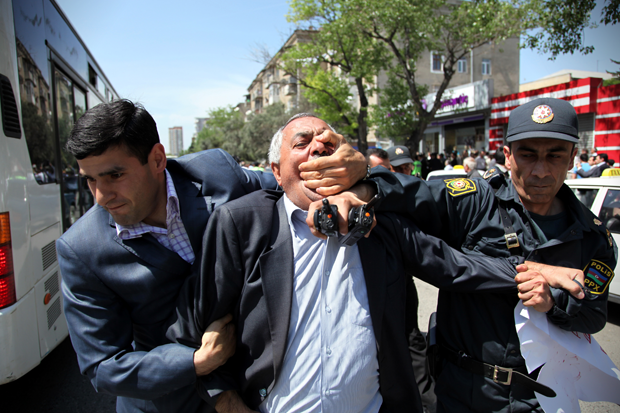
Narimanov Park, Baku, 15 May 2010. Police forcibly detain a political activist during an unsanctioned protest. Photograph by Abbas Atilay
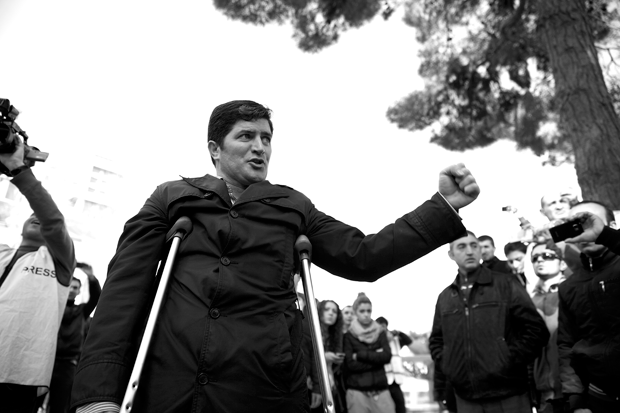
Fountain Square, Baku, 10 March 2013. A political activist during an unsanctioned demonstration protesting the deaths of military conscripts in non-combat situations. Authorities used excessive force to disperse the peaceful protest and detained more than 100 people. Photograph by Jahangir Yusif
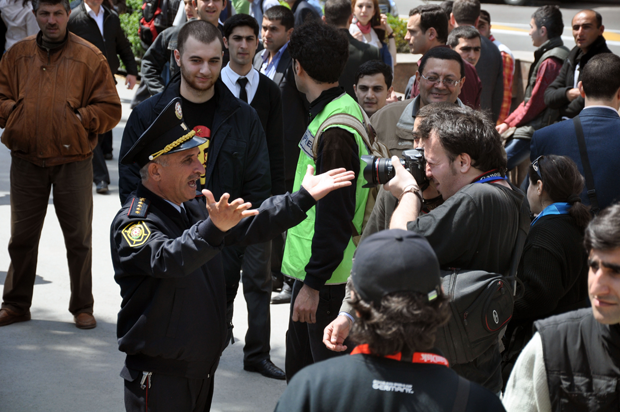
Sabir Park, Baku, 11 March 2011. During an unsanctioned political protest
in the wake of the Arab Spring, a police officer encourages journalists to take his photo. This was a rare move, which the photographer believes was intended to distract photographers from other aspects of the protest, such as police physically restraining protesters. Photograph by Mehman Huseynov
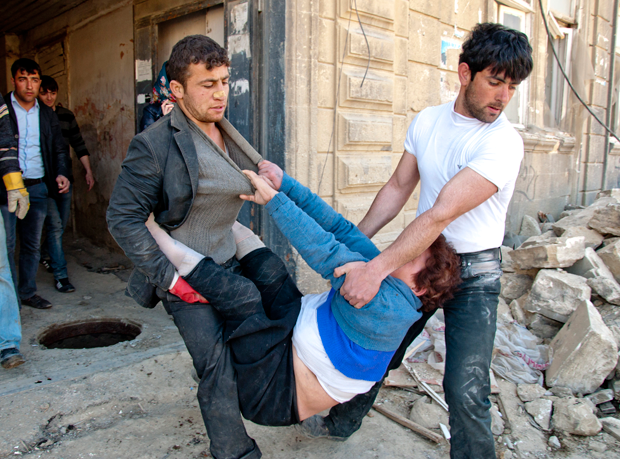
Shamsi Badalbayli Street, Baku, 2 April 2012. A resident is forcibly evicted from the area where the Winter Garden will be constructed. Approximately 300 complaints have been sent to the European Court of Human Rights related to forced evictions from this area. Photograph by Ahmed Muxtar
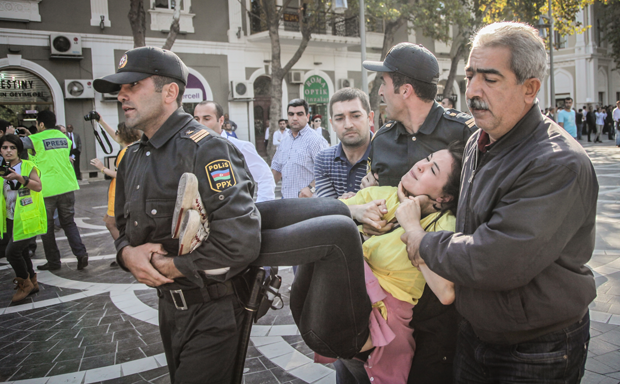
Fountain Square, Baku, 20 October 2012. Police detain a young opposition activist during an unsanctioned protest calling for parliament to be dissolved after a video was released showing an MP discussing the sale of parliamentary seats. Dozens of activists were detained during that protest. Photograph by Aziz Karimov
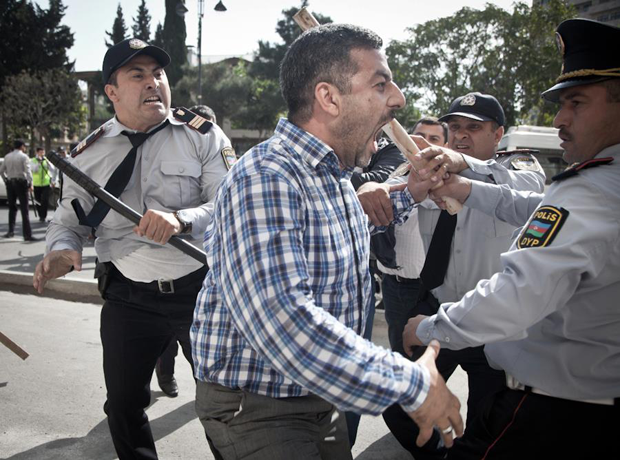
Hijab ban, 5 October 2013. Photograph by Aziz Karimov
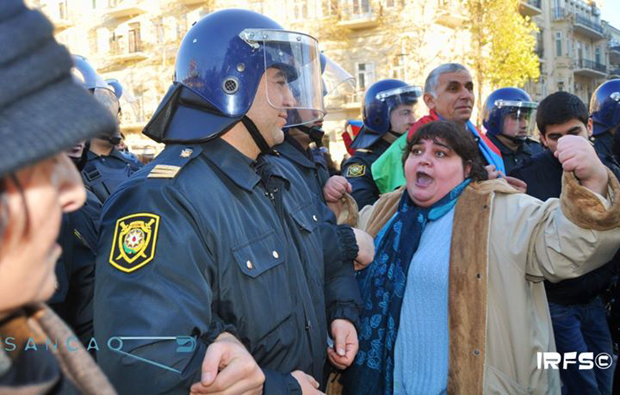
Investigative journalist Khadija Ismayilova confronts police. Photograph by Mehman Huseynov
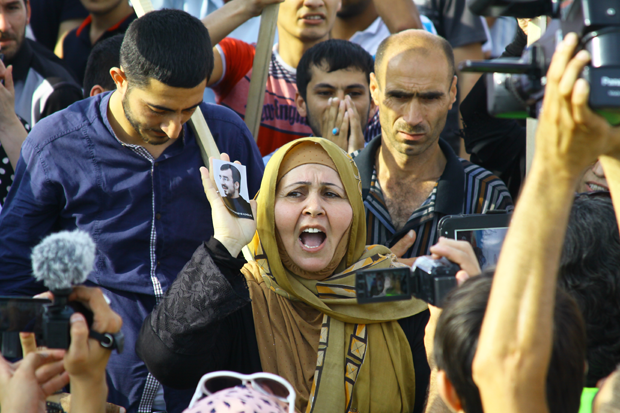
Nevreste Ibrahomova, head of Azerbaijan Islamic Party’s Women Council, holds the photo of an arrested Azerbaijani Islamist and chants freedom to him. Photograph by Shahla Sultanova
Photographers also face arrest and protracted legal action as a result of their work. Mehman Huseynov faces up to five years in prison on politically motivated hooliganism charges stemming from an altercation with a police officer during protests ahead of the Eurovision Song Contest in May 2012. The photographers featured in this story are among the few courageous individuals in Azerbaijan who remain willing to take on the risks associated with this work. They need international support and protection before they, too, become the subjects rather than the artists.”
Rasul Jafarov is the chairman of the Human Rights Club and project coordinator of the Art for Democracy Campaign. Rebecca Vincent is Art for Democracy’s advocacy director. She writes regularly on human rights issues in Azerbaijan
To find out more about the magazine and for subscription options, and read more about stories from the issue click here. These photographers will be part of an exhibition in London this winter. For more details, follow @art4democracy Join us to launch of Index on Censorship’s autumn issue on 15 October. To register for the event, click here.
8 Oct 2013 | Azerbaijan, Azerbaijan News, News and features

Looking forward to another election win. (Photo: PanArmenian / Demotix)
Tomorrow, on 9 October, Azerbaijan will hold a presidential election, with incumbent President Ilham Aliyev seeking a third term in office. Although the government and its supporters have been working hard to promote a positive image of Azerbaijan abroad, at home, they continue to crack down on citizens’ ability to exercise their basic rights and fundamental freedoms, in an apparent effort to silence all voices of criticism and dissent.
Despite superficial efforts to make the election look like a serious competition – for example, by registering a staggering 10 candidates – there is not an even playing field for all candidates. The only candidate widely agreed to be independent, united opposition candidate Jamil Hasanli, is fighting an uphill battle with limited resources against a powerful incumbent with the full resources of an oil-rich state behind him.
Below, I examine five of the main underlying issues presenting challenges to the fair and free conduct of this election, unsavoury truths that the authorities would rather not be included in reporting on this election. As a result of these and other issues, regardless of what now happens on election day, the chances of a democratic election have effectively been eliminated. The underlying climate has simply not allowed for a fair competition.
1. There are 142 people locked up for political reasons in Azerbaijan
At a press conference in Brussels in June, President Aliyev stated: “None of my political opponents is in prison. There are no political prisoners in Azerbaijan”. These claims simply are not true. A new list from the Baku-based Human Rights Club outlines 142 current cases of politically motivated detention and imprisonment in Azerbaijan. These include journalists, bloggers, human rights defenders, civic and political activists, religious followers, and ordinary citizens, many of whom were targeted for exercising their fundamental rights to freedom of expression, assembly, and association.
One of Azerbaijan’s political prisoners is the Republican Alternative (REAL) movement’s would-be presidential candidate, Ilgar Mammadov, who has been detained since February. After visiting the region of Ismayilli to investigate on-going protests, he was then charged with inciting violent protest, and faces up to 12 years in prison if convicted. Although REAL was able to gather the more than 40,000 signatures required to register a presidential candidate, the Central Election Commission declared some of the signatures invalid and refused to register Mammadov’s candidacy.
2. Aliyev has gotten far greater media coverage in the country than any of his opponents
Azerbaijan’s state-controlled broadcast media rarely shows opposition figures. Out of Azerbaijan’s nine national television stations, three are directly owned by the state, five are privately owned but controlled by the state, and the public service broadcaster, Ictimai, is failing to fulfil its role as a public service broadcaster as it does not provide balanced and varied programming. In contrast to the hours of television coverage incumbent President Aliyev receives every day throughout the year, the other presidential candidates have received only 18 minutes of airtime each week for the three weeks of the campaign period.
Three independent media outlets which have been relegated to the Internet since a 2009 ban took them off the air – the Azerbaijani services of the BBC, Radio Free Europe/Radio Liberty, and Voice of America – have been accused by the Central Election Commission of being in “propaganda mode” during the campaign period – presumably for daring to cover the opposition’s campaign activities, and not just the president’s.
3. The opposition is challenging Aliyev’s right to run for a third term
This is perhaps the most significant factor making this election stand out from previous elections in Azerbaijan, and may account for the unprecedented crackdown in the run-up to the election: the opposition claims that Aliyev does not have the constitutional right to run for a third term in office. The united opposition candidate, Jamil Hasanli, has filed a legal appeal in this regard, which will be examined by the Baku Court of Appeals today.
What is the basis of this appeal? When Aliyev came to power in 2003, and when he was re-elected in 2008, there was a two-term limit on the Azerbaijani presidency. This limit was removed through a Constitutional referendum in 2009. Hasanli and his supporters argue, however, that the changes do not apply retroactively to Aliyev, but should apply instead to his successor, meaning he does not have the right to run for a third term.
Further, University of Sydney Professor Wojciech Sadurski issued a legal opinion arguing that Azerbaijan’s removal of the term limitation was done in an undemocratic manner, contrary to the principles of openness and transparency. Sadurski considered this action to be a breach of the European Convention on Human Rights, to which Azerbaijan is party.
4. Azerbaijan has not had a fair and free election since Aliyev came to power
Including the election that brought Ilham Aliyev to power in 2003, Azerbaijan has held two presidential elections and two parliamentary elections in the past 10 years. All fell far short of meeting international standards for democratic elections, largely due to restrictions of freedom of expression and assembly in the pre-election period, resulting in a lack of robust competition and vibrant political discourse.
The Azerbaijani government seems intent on repeating its past mistakes with this election. The most recent interim report issued by the OSCE/ODIHR’s election observation mission highlighted similar problems to previous election periods, noting that the campaign period “has been marred by some reported incidents of intimidation of family members of political figures.” The report also concludes that “the campaign has lacked substantive debate and has focused on personality rather than concrete political platform” and states “the incumbent President received a much greater amount of coverage in news programmes on television in comparison to other political actors.”
5. Azerbaijan is failing to fulfil its human rights obligations with all major international bodies
The fact that Azerbaijan is failing to fulfil its human rights obligations with the Council of Europe, the OSCE, and the United Nations (UN), and its human rights agreements with the European Union, is the elephant in the room, both in the context of this election and in broader international relations with Azerbaijan.
The pattern of systematic and widespread violations of human rights by the Azerbaijani authorities is well documented. Just last week, three UN special mandates, the OSCE Representative on Freedom of the Media, and the Council of Europe Human Rights Commissioner all spoke out with concerns related to human rights violations in the pre-election period.
Despite this knowledge, the political leadership of these bodies and their member states remain reluctant to seriously address these shortcomings. As a result, the Azerbaijani authorities continue to act with impunity, certain that their failure to implement their human rights commitments will not result in serious consequences for other areas of their bilateral and multilateral relations. How then can they be expected to behave differently in this election period?
But rather than write off this election – as some international media outlets have already done, pre-emptively declaring another victory for Aliyev – the international community must take note of what happens and take a stand. International observers must report accurately and fully on the election, and the government must be held accountable for shortcomings through the full political weight of the organizations behind the reports and their individual member states. Azerbaijan cannot continue to be treated as a privileged member of the international democratic community without the credentials to back it up.
And most importantly, the international community must sustain attention to Azerbaijan well beyond the election period. Local journalists, human rights defenders, and activists fear a post-election crackdown even harsher than what occurred in the run-up to the election. If these remaining few critical voices are successfully silenced, then many more elections in Azerbaijan will follow suit as foregone conclusions.
This article was originally published on 8 Oct 2013 at indexoncensorship.org










